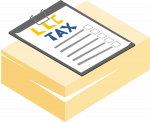South Carolina LLC Taxes
By default, South Carolina LLCs are taxed as pass-through entities, meaning the business does not pay any sort of LLC income tax. Instead, the member or members of the LLC pays for the LLC’s losses and revenue on their personal income taxes and pay the state’s graduated income tax rate ranging from 0% to 7%. Membersare also taxed at the 15.3% federal self-employment tax rate (12.4% for social security and 2.9% for Medicare). For LLCs that have C-corp tax election, they’ll have to pay the state’s corporate income tax of 5%. Read on to learn more about South Carolina LLC taxes and how to file.
In this article, we’ll cover:


How Are South Carolina LLCs Taxed?
How your South Carolina LLC is taxed is based on the number of members your LLC has. Single-member LLCs (SMLLC) are taxed as sole proprietorships by default. LLCs that have two or more members are considered multi-member LLCs and are taxed as partnerships by default. The forms you’ll need to file are:
- Single-member LLC—Form 1040 (usually Schedule C, but some SMLLCsfile C-EZ, E, or F)
- Multi-member LLC—Form 1065
You can elect S-corp or C-corp tax status for your LLC. Though it’s not as simple as checking a box. Here’s what being taxed as a corporation means for your business and how to file:
South Carolina LLCs taxed as S-corp
S-corp status is a federal tax election available to both corporations and LLCs who meet the IRS requirements, like having only one class of stock. Your LLC can also make distributions to its members that aren’t subject to the 15.3% self-employment tax, though you will still have to pay it on your salaries. S-corp LLCs retain their pass-through status without the self-employment penalty on all the LLC’s distributions.
If you’d like to apply for S-corp status for your LLC, file Form 2553 with the IRS. LLCs that have S-corp status file Form 1120-S to report their income to the IRS. Consult an accountant before making any drastic tax changes to your business.
LLCs taxed as C-corp
C-corp tax status is the default filing status for corporations, though it’s not common, LLCs can elect to be taxed as corporations. For LLCs filing as C-corps in South Carolina, you’ll file Form 1120 with the IRS. All corporations, including LLCs filing as C-corps. While C-corps are double-taxed, they are more attractive to investors and have more tax breaks available to them than LLCs with default or S-corp status. Like with any major financial change to your business, speak with a professional first.

South Carolina State Income Tax
South Carolina LLCs filing as LLCs pay the state’s graduated income tax rate that ranges from 0% to 7%. The rates are dependent on your taxable income.
-
Taxable Income
South Carolina Personal Income Tax Rate
$0-$2,670 0% $2,670-$5,340 3% $5,340-$8,010 4% $8,010-$10,680 5% $10,680-$13,350 6% $13,350+ 7%
You must file Form SC1040 with the Secretary of State to pay your default LLC tax filings. LLCs taxed as S-corps file Form SC-1120s, while LLCs with C-corp status file Form SC1120. C-corp LLCs pay the state’s low corporate income tax of 5%.

Sales and Use Tax
The sales rate in South Carolina is 6%, with local counties able to add an additional percentage to the tax. Sales tax is placed on the sale of certain goods and services in the state. South Carolina’s use tax is also 6% and is collected for the purchase of goods in South Carolina. There are additional and more specific sales and use taxes for certain industries and services, like dry cleaning, heavy industrial rentals, and hand-crafted products sold at art shows and festivals.

Local South Carolina Taxes
Local towns and cities in South Carolina are able to levy an additional sales and use tax on top of the state one, but not every town does. For example, in Columbia, there is a sales and use tax at the county level at 2%. There may also be additional taxes on the local-level, like Myrtle Beach’s 2% special tax on hospitality industries.

Other Taxes in South Carolina
While we’ve covered the taxes your LLC pays at the federal, state, and local level, let’s go over the remaining taxes your business may encounter.
South Carolina State Employer Taxes
If your LLC has employees, you’ll need to factor in unemployment insurance and workers’ compensation taxes.
- Unemployment (UI) Tax—In South Carolina, unemployment insurance tax is charged on the first $14,000 in wages per individual and is based on your history as an employer. Once you’ve paid that, you won’t have to pay anymore for that individual until next year. New employers without any history of paying into the program are taxed at the base rate of 0.390%. Check South Carolina’s 2023 Unemployment Insurance Tax Rates page for all rate classes.
- Workers’ Compensation—If you have four or more employees, you are legally required to carry workers’ compensation insurance in South Carolina. You don’t need to have it if you only have casual employees or independent contractors. Your rates will depend on your industry, number of employees, and risk of injury present in the environment or work tasks.
To learn more about South Carolina employer taxes, visit the South Carolina Department of Employment and Workforce and South Carolina Workers’ Compensation Commission websites.
Industry Taxes
The South Carolina Department of Revenue places taxes on certain industries, including:
- Breweries
- Cigarette and other tobacco retailers
- Coin-operated device operations
- Out-of-state wine dispensaries

Do foreign LLCs in South Carolina need to pay South Carolina taxes?
Yes. South Carolina foreign LLCs have to pay the same taxes outlined above. If the foreign LLC files as an S-corp, you must withhold 5% of any out-of-state members’ taxable income. A foreign LLC is an LLC that was formed outside of South Carolina but registered to do business in the state. When you set up a physical location in the state, you’ll also have to check local municipalities for any taxes owed at the local-level.





